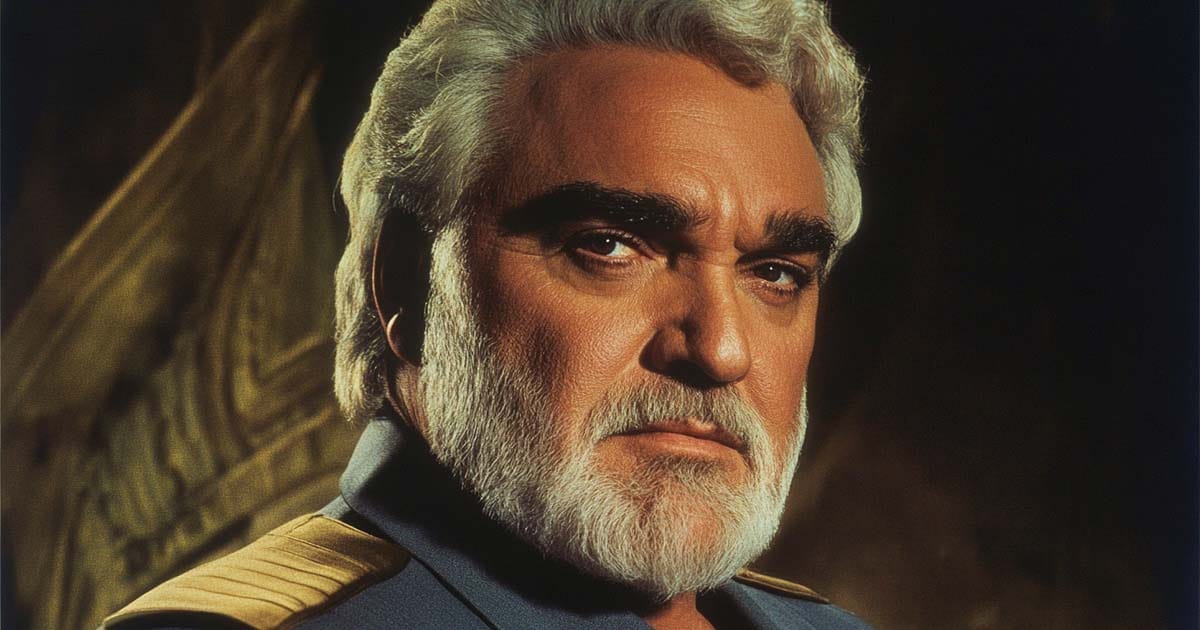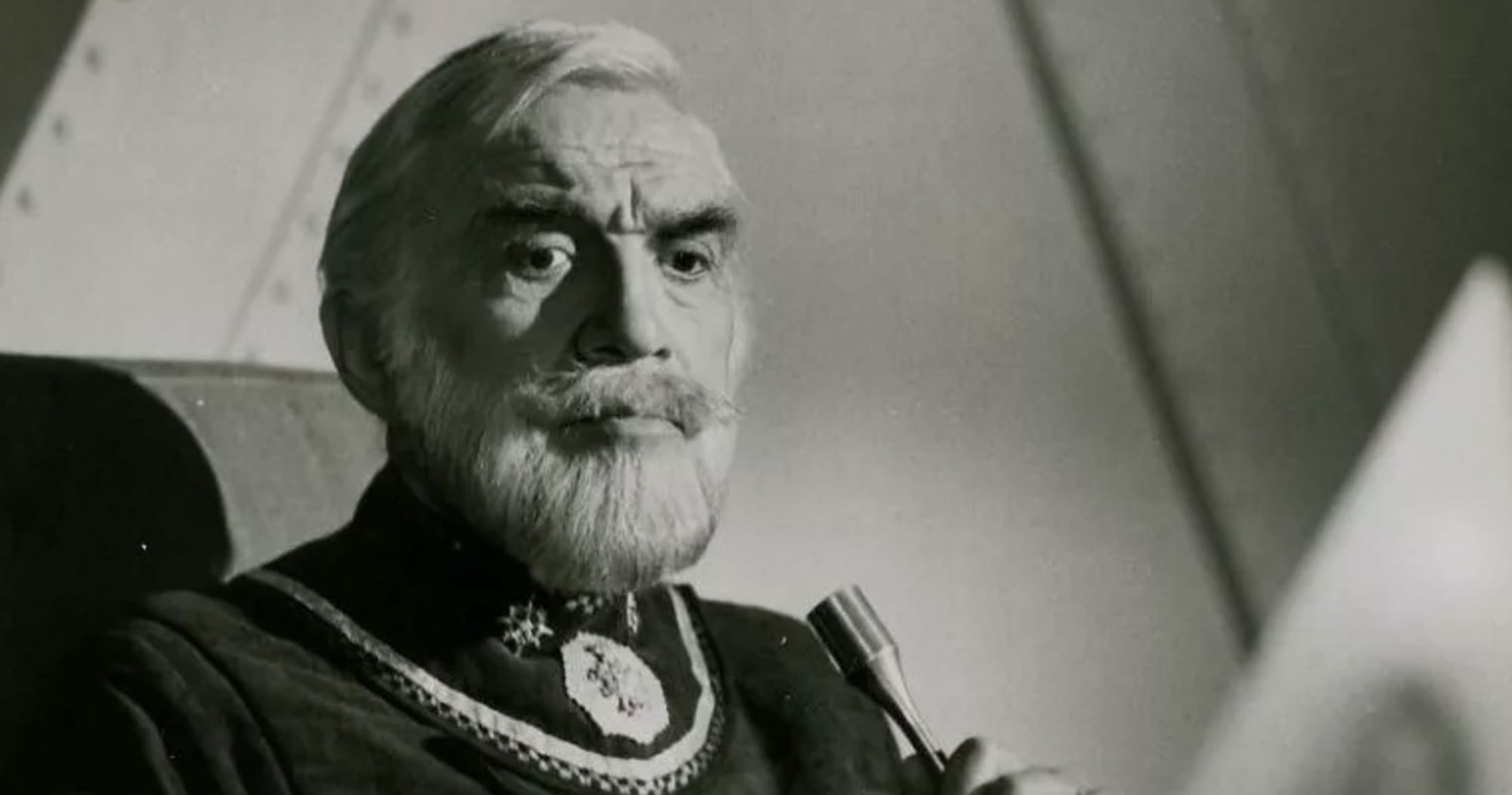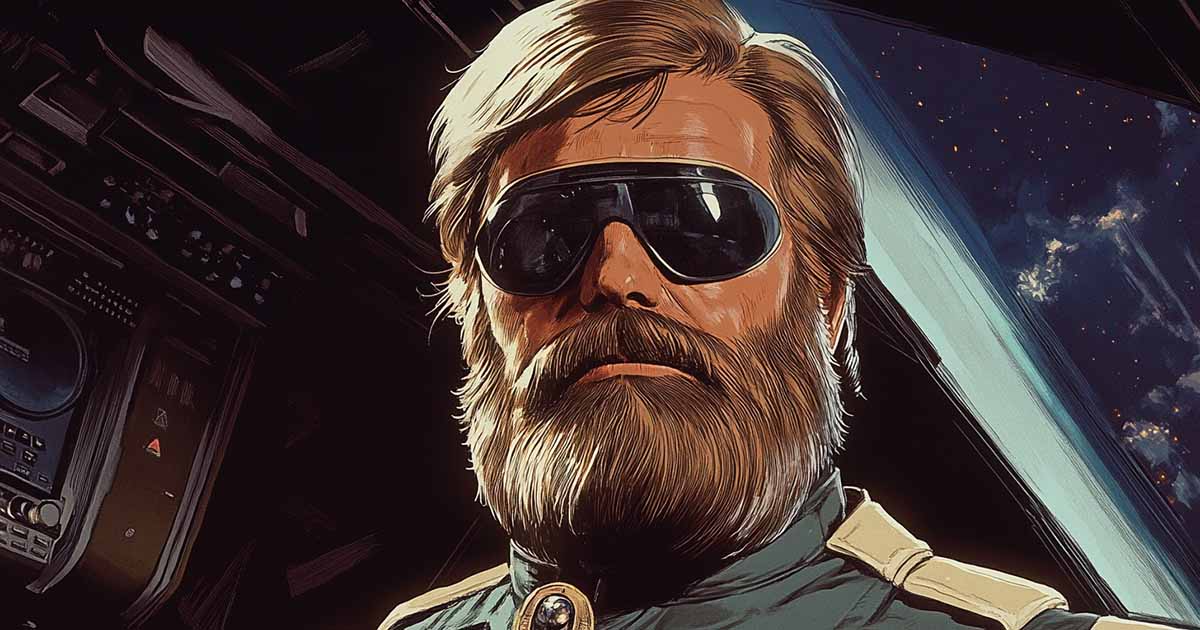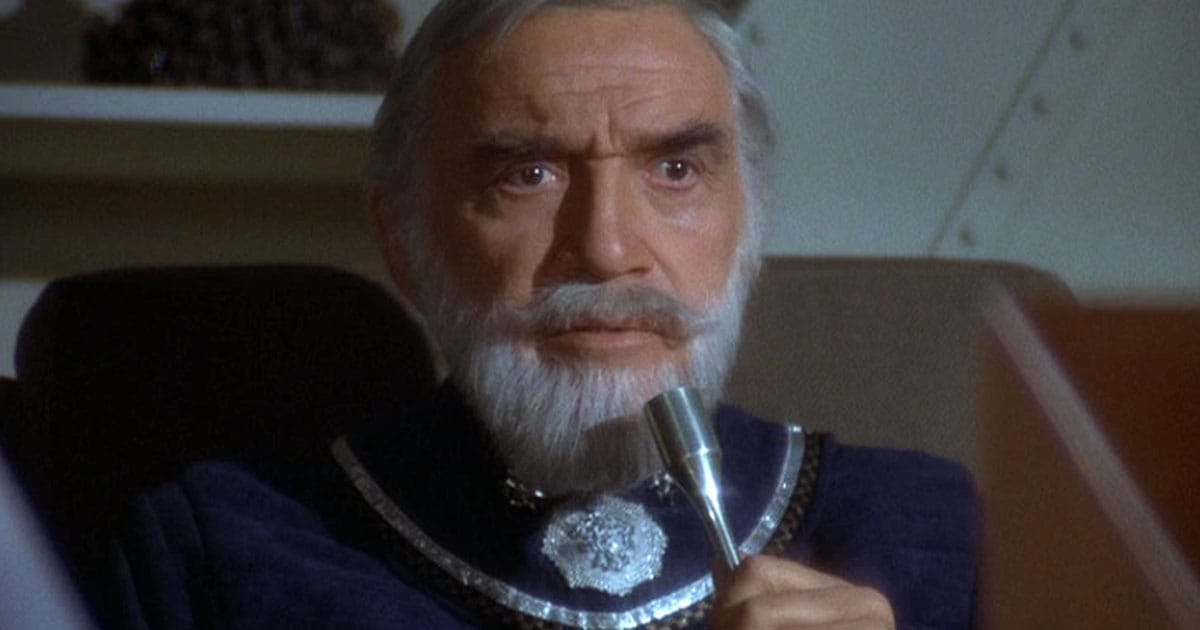The Five Reasons Every Male Character in the 1978 "Battlestar Galactica" Should Have a Beard
An analytical examination of how beards could have enhanced the 1978 Battlestar Galactica series, exploring military tradition, leadership qualities, and traditional values in classic science fiction television.

When Glen A. Larson created "Battlestar Galactica" in 1978, he gave television audiences a masterpiece of traditional values wrapped in the trappings of space opera.
The show exemplified the virtues of leadership, courage, and faith that built America. Yet one element could have further reinforced these timeless themes —the rugged masculinity of a well-maintained beard.
This post delves into the depths of "Battlestar Galactica" and the multifaceted benefits of beard-growing to unveil the top five reasons why every male character in the series should have sported a glorious beard.
Humanity's Greatest Test
The story begins with humanity facing extinction. The Twelve Colonies, representing the height of human civilization, fall to the mechanical Cylons through treachery and overwhelming force.
Commander Adama, leading the "Battlestar Galactica" and a ragtag fleet of civilian ships, guides the survivors on their exodus to find Earth. This biblical parallel of a chosen people seeking their promised land resonates deeply with American and Christian traditions.
The premise demands characters who embody strength, wisdom, and determined leadership. The beard has long symbolized these qualities in classic American storytelling, from frontier tales to modern fiction.
Leadership and Authority
Commander Adama, portrayed by the distinguished Lorne Greene, already commanded respect through his presence and bearing. Imagine him with a dignified salt-and-pepper beard, reminiscent of biblical patriarchs leading their people through trials.

Such an appearance would have visually reinforced his role as both military commander and spiritual leader of humanity's remnants.
The beard historically symbolizes wisdom and authority, from ancient kings to frontier leaders. For Adama, facing decisions that would determine humanity's survival, this visual representation of experienced leadership would have added gravitas to his crucial role.
Martial Prowess and Protective Strength
Captain Apollo and Lieutenant Starbuck, as Viper pilots defending the fleet, represent the warrior class of their society.
A well-maintained beard would have emphasized their roles as protectors. Consider the American military traditions where beards marked special operators and wilderness fighters —men who ventured into the most dangerous territories to defend civilization.
For Apollo specifically, a neat, military-style beard would have enhanced his image as a leader of men, following in his father's footsteps while forging his own path.
For Starbuck, a rakish beard would have complemented his maverick nature while suggesting the maturity that lurked beneath his devil-may-care exterior.
The Time-Honored Benefits of the Beard
Beards symbolize masculinity, wisdom, and power. Facial hair has adorned the faces of men who command respect and inspire awe. But the benefits of beards go beyond mere aesthetics.
Here are a few ways a beard can enhance a man's life.
Sun Protection. Beards act as a natural shield against harmful 95% UV rays, reducing the risk of sunburn and skin cancer. This is particularly important for the crew of the Galactica, who are constantly exposed to the harsh radiation of space and the intense sunlight of alien worlds.
Imagine Apollo landing on a scorching desert planet, his beard protecting his face from the harsh sun as he searches for vital resources.
Warmth and insulation. A beard is a natural insulator, fortifying the face and neck against the cold.
In the vastness of space, where temperatures can plummet to unimaginable lows, this added warmth could be the difference between life and death.
Picture Starbuck braving the icy winds of an arctic planet, his beard keeping him warm as he repairs his damaged Viper.
Better Appearance. Let's face it, beards look awesome. They bestow a rugged handsomeness and a touch of danger on a man's appearance. What's more, every serious study ever conducted shows that worthwhile women prefer fellows with beards.
Imagine Starbuck with a thick, manly beard, wooing the ladies with his irresistible charm.
Skin health. Beards can help protect the skin from the elements and prevent dryness. They also reduce the risk of ingrown hairs and razor burn, which can be a real nuisance for a spacefaring warrior constantly on the move.
Social perception. Studies have shown that beards can enhance a man's perceived social status, dominance, and maturity. For the leaders of the Galactica, a beard could project an aura of authority and command, inspiring confidence in their followers.
Battlestar Beards Are a Must
With the context set and the benefits of beards established, let's delve into the core of our argument. Here are the top five reasons why every male character in the 1978 "Battlestar Galactica" should have had a beard.
No. 1. Increased Cylon Respect
Imagine the Cylons, those chrome-domed toasters, encountering a fleet of humans with flowing, majestic beards. They would be awestruck by the sheer virility and masculinity of their adversaries. The Cylons might even question their mission to exterminate such magnificent specimens of humanity.
More seriously, in warfare, psychological advantage often proves as decisive as technological superiority.
The Cylons, in spite of their mechanical nature, demonstrate an understanding of human psychology through their use of the traitor Baltar. This implies they possess the capacity to recognize and respond to displays of human strength and authority.
Consider the historical precedent of military bearing. Throughout human history, from Roman centurions to American cavalry officers, facial hair has served as a mark of veteran status and combat experience. The Cylons, programmed with detailed knowledge of human history and psychology, would likely process this visual indicator of warrior status.
Commander Adama's theoretical beard would have been a symbol of patriarchal authority during diplomatic encounters. When facing Cylon basestars or meeting with their representatives, his bearded visage would have projected the gravitas of human civilization's enduring strength. This visual assertion of authority could have subtly influenced Cylon tactical calculations and diplomatic interactions.
No. 2. Improved Combat Prowess
As implied above in No.1, a beard can intimidate an enemy and bolster a warrior's confidence.
Picture Captain Apollo leading a squadron of Viper pilots, their beards flowing in the wind as they engage in a fierce dogfight with Cylon Raiders. The sight alone would strike fear into the hearts of their robotic foes. Thus, beards are a warrior's edge.
The correlation between facial hair and combat effectiveness is rooted in military tradition. From ancient Spartan warriors to American Civil War generals, beards have long been associated with battlefield prowess and tactical acumen. This association, far from a mere coincidence, reflects practical advantages that would have served the colonial warriors well in their battles against the Cylons.
Consider the environment of a Viper cockpit during combat operations. The sealed environment, while necessary for survival in space, creates significant physical stress on a pilot's skin. A well-maintained beard provides natural protection against the chafing and irritation caused by pressure seals and flight suits. This practical benefit would have allowed colonial warriors to maintain peak performance during extended combat operations.
The traditional military beard also serves as a natural filter against environmental hazards. During ground operations on hostile planets or boarding actions against Cylon vessels, this natural filtration system would have provided additional protection against atmospheric contaminants and metallic particles common in spacecraft environments.
Historical records from Earth's military forces document how bearded special operations units often displayed enhanced unit cohesion and combat effectiveness. The shared practice of beard maintenance created bonds between warriors while marking them as elite fighters. Within the colonial fighter squadrons, this tradition could have strengthened the already formidable bonds between pilots, potentially improving their coordination during complex combat maneuvers.
Furthermore, the presence of beards among colonial warriors would have provided practical advantages during hand-to-hand combat situations. The beard's ability to protect vital areas of the neck and face could prove decisive in close-quarters battle with Cylon centurions. Military history provides numerous accounts of bearded warriors using this natural armor to their advantage in critical combat situations.
No. 3. Enhanced Survival Skills
The harsh realities of space exploration demand every possible survival advantage. Throughout human history, beards have served as natural adaptations to extreme environments, from arctic expeditions to desert warfare.
The colonial fleet's situation, with its limited resources and hostile environments, presents compelling arguments for the survival benefits of facial hair. In fact, a beard is nature's gift to the explorer and the warrior.
In emergency situations, beards provide essential insulation against temperature extremes. Consider a scenario where colonial warriors must survive on a hostile planet after a Cylon attack. The beard's natural insulating properties could mean the difference between survival and exposure, particularly in cold environments where every degree of warmth matters. Historical records from Earth's polar expeditions consistently note the survival advantages of facial hair in extreme conditions.
The beard also serves as a natural defense against environmental hazards. When exploring unknown planets or navigating damaged spacecraft, a well-maintained beard acts as a first-line filter against atmospheric particulates, metallic debris, and other airborne threats.
This natural filtration system would have been particularly valuable during emergency repairs or survival situations where standard protective equipment might be compromised or unavailable.
Water conservation, a critical concern for the fleet, would have benefited from the widespread adoption of beards. The elimination of daily shaving would have saved significant amounts of water over time, demonstrating the kind of resource management essential for long-term survival. This practical consideration aligns with the fundamental principles of space survival: maximize resources and minimize waste.
Beards provide natural protection against solar radiation, a constant threat in space environments. During emergency situations where standard radiation protection might be compromised, this natural shield would have offered an additional layer of defense. The colonial fleet, operating with limited medical resources, would have benefited from any natural protection against radiation-related health issues.
No. 4. Boosting Morale
In times of crisis, maintaining high morale becomes as crucial as maintaining military readiness. Facial hair's psychological impact on individual confidence and group cohesion has been well-documented throughout military history. These psychological benefits could have been invaluable for the colonial fleet facing extinction while pursuing a distant hope.
Military studies consistently show that shared traditions and distinctive appearances strengthen unit cohesion. Growing and maintaining beards creates a shared experience that builds camaraderie among warriors. For the colonial fleet's military personnel, this shared tradition could have reinforced their sense of belonging and purpose, which is particularly important when facing an enemy that embodies conformity and mechanistic sameness.
Historical evidence from Earth's military forces demonstrates that distinctive appearance features, such as beards among special operations units, often correlate with elevated unit pride and improved performance. The colonial warriors, permitted to grow and maintain professional beards, likely experienced similar benefits. This visual distinction would have served as a constant reminder of their elite status and special responsibility to protect the fleet.
No. 5. Attracting Space Babes
The continuation of human civilization depends not only on survival but on the formation of traditional family units. Beards play a significant role in courtship and marriage customs.
For the colonial fleet, where the future of humanity hung in the balance, these traditional signals of masculine maturity and readiness for family life held particular importance.
Historical records consistently demonstrate that well-maintained beards indicate a man's capability to provide for and protect a family. In the context of the colonial fleet, where every surviving human carried the responsibility for humanity's future, such traditional markers of masculine reliability would have gained renewed significance.
Consider Lieutenant Starbuck, whose natural charm could have been enhanced by the gravitas a professional beard provides, potentially directing his romantic pursuits toward more serious, marriage-minded objectives.

Additionally, facial hair historically signifies a man's transition from youth to mature adulthood. In a society focused on rebuilding, such clear visual markers of male maturity and readiness for family responsibility would have facilitated appropriate courtship customs. Captain Apollo, as both a warrior and single father, could have benefited from this traditional symbol of paternal authority and protective capability.
Honoring Tradition Through Appearance
"Battlestar Galactica" is a testament to traditional values —faith, leadership, and the triumph of the human spirit over mechanistic evil. Adding beards to its male characters would have visually reinforced these themes while connecting to a rich tradition of American storytelling.

The show succeeded magnificently without this element, but considering it reveals how even small details can enhance greater themes. In an era when entertainment often blurs moral lines, the show's clear vision of right and wrong, leadership and duty, remains refreshing. The beard, as a symbol of masculine virtue and leadership, would have been a fitting addition to this classic series.
As we look back on this groundbreaking show, we can appreciate both what it achieved and how such subtle touches might have further emphasized its timeless message.
In the end, "Battlestar Galactica" reminds us that humanity's greatest strengths lie not in technology, but in faith, leadership, and the courage to defend what's right —with or without beards.

